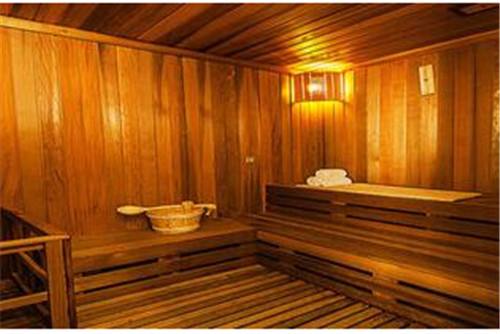- 本文目录导读:
- Introduction
- The Sauna Experience
- Impact on Cardiovascular System
- Effects on Blood Pressure
- Heart Rate and Sauna
- Heat Shock Proteins and Cardioprotection
- Chronic Conditions and Sauna Therapy
- Considerations and Safety
- Conclusion
Introduction
In recent years, the sauna has emerged not only as a place for relaxation but also as a potential contributor to heart health. Understanding the relationship between sauna use and cardiovascular wellness is crucial as we delve deeper into the mechanisms and benefits it offers. This article explores the physiological effects of sauna bathing on the heart and its implications for overall health.
The Sauna Experience
Saunas, originating from Nordic cultures and now prevalent worldwide, typically involve exposure to dry heat in a controlled environment. The temperature inside a sauna can range from 70°C to 100°C, with low humidity. This heat exposure induces sweating, relaxation of muscles, and often a sense of mental tranquility.
Impact on Cardiovascular System
The cardiovascular system undergoes notable changes during sauna bathing. As the body is exposed to heat, blood vessels dilate (vasodilation), leading to increased blood flow. This process mimics the effects of moderate physical exercise, enhancing circulation and potentially improving endothelial function over time. Endothelial cells line the blood vessels and play a crucial role in vascular health.

Effects on Blood Pressure
Studies have shown that regular sauna use can help lower blood pressure, a significant risk factor for heart disease. The combination of vasodilation and increased heart rate during sauna sessions can lead to a temporary reduction in blood pressure post-sauna. For individuals with hypertension, this effect may be particularly beneficial when combined with other lifestyle modifications.
Heart Rate and Sauna
Heart rate also increases during sauna bathing as the body works to maintain thermal balance. This increase is comparable to that experienced during moderate physical exercise, making sauna bathing a potential complement to cardiovascular workouts. Over time, regular sauna use may contribute to improved heart rate variability, a marker of heart health.
Heat Shock Proteins and Cardioprotection
One of the intriguing mechanisms behind sauna's cardiovascular benefits involves heat shock proteins (HSPs). These proteins are produced in response to heat stress and play a role in protecting cells from damage. In the context of heart health, HSPs may help reduce inflammation and oxidative stress, factors implicated in cardiovascular diseases.
Chronic Conditions and Sauna Therapy
Beyond acute effects, sauna therapy has shown promise in managing chronic conditions such as congestive heart failure and coronary artery disease. While individuals with these conditions should consult healthcare providers before starting sauna sessions, controlled exposure to heat may offer symptomatic relief and improve quality of life.

Considerations and Safety
Although sauna bathing presents potential benefits for heart health, it is essential to practice caution, especially for individuals with pre-existing medical conditions. Staying hydrated and avoiding excessive heat exposure are crucial. Furthermore, pregnant women, individuals with acute illnesses, and those on medications affecting blood pressure should seek medical advice before sauna use.
Conclusion
In conclusion, sauna bathing represents more than just a relaxation practice—it holds promise as a supportive therapy for cardiovascular health. By promoting vasodilation, lowering blood pressure, and inducing physiological responses akin to moderate exercise, saunas offer a holistic approach to maintaining heart wellness. However, like any health intervention, it should be approached mindfully and in consideration of individual health circumstances.
转载请注明:成都会所桑拿-四川成都休闲桑拿推荐论坛! » 武汉休闲 » Sauna and Heart Health: Exploring the Beneficial Effects of Sauna on Cardiovascular Wellness
版权声明
本文仅代表作者观点,不代表成都休闲网立场。
本文系作者授权发表,未经许可,不得转载。




























